Leadership at TKGS
|
The School as a Community… |
|
|
Mrs Maude Scott, Principal, 1953-1960 |
|
A Perceptive and Caring Principal “I had a personal encounter with Mrs Scott in Form 2 (Sec 1), when we were fairly new at school. Mrs Scott usually set the school an “extra” composition when she had staff meetings for about one period. She used our writings to get feedback on particular topics she wanted to know more about. One morning, the topic was ‘The School Tuckshop”. “I managed only a three-lined paragraph saying I knew little about it as I did not visit it. Lo and behold, I got a ‘See Me’ with her firm signature under my mini paragraph when our extra composition books were returned. Book in hand, I went to her office as required, expecting to be ticked off for my poor effort. Imagine my relief when all Mrs Scott wanted to know was why I had not been using the tuckshop facilities. She was concerned that I might be one of those needing pocket money for the recess break, and smiled when I told her I brought sandwiches from home and my own water bottle. She sure impressed me as a kindly soul that day.” Wong Oi Kwan, Class of 1959-1962 “We remember Mrs Scott as a strict but kind principal who was task-oriented. She used to have short staff meetings every morning, after which the form teachers would dutifully return to their respective classes to brief us on the latest happenings. In those days there was no public address system, so she would send the office peon (Rahim) from class to class with a hard cover A5 sized book with notices written in her distinctive handwriting – with messages for the school or teachers. As there was no electronic bell then, the school had a big hand bell placed outside the office and the peon, Rahim would normally ring the bell to signify every change of period. Sometimes, Mrs Scott would ring the bell herself if Rahim was not around. Mrs Scott would walk along the corridors on her daily rounds and whenever she was outside our classroom, the students and teachers were equally scared. Mrs Scott was a true professional in that she carried out her duties with much pride and dignity, so that when I became a Principal years later, I tried to emulate her professionalism and the values such as respect, humility, modesty, and loyalty that she imparted to us.” Mrs Ng Gek Tiang, Class of 1959-1962 |
=================================================
|
Towards Gender Equality |
|||||||
|
“…life is a long process of learning. To stop learning is to stop breathing. Allow no pride, vanity nor
Miss See Tin See, Principal, 1960-1965 |
|||||||
|
Under Miss See’s leadership, TKGS became an integrated school in 1962, with the Chinese and Malay language streams merging with the English stream. Following the government’s policy of equal emphasis on the four official language streams, the various streams shared school facilities such as classrooms, science laboratories, library and playing fields.
“The saying ‘the hand that rocks the cradle rules the world’ contains much truth. From birth, a child is more susceptible to a mother’s influence than a father’s. Thus from infancy, the hopes and aspirations of a mother are infused into the child. This in a way helps explain why the affluence and advancement of a society is a determined by the proportion of its educated women.” Kong Lai Peng, Editor of School Annual, 1966 “My first choice was TKGS. It was a natural choice for Haig Girls’ student, because TKGS was just next door. Even those with good results never considered Raffles Girls’ Secondary. It was always TKGS we aspired to, because, to us, it was the best. I liked the school uniform too. We thought its environment was good and we liked the canteen, where we could mingle after lessons.” Mrs Lim Suat Hua, Architect, SH Lim Architects, Student of TKGS, 1960-1963, Member, School Advisory Committee |
|
A Principal of Grace and Discipline “We remember Miss See as a strict disciplinarian with a kind heart. She was posted to TKGS when we were in Form 3 (1960). She would stand outside her office to ensure that movement along the corridors during changeover of periods or when we walked to the hall for our weekly assembly was orderly and quiet. Once in the school hall, we had to observe silence, supervised by the teachers and prefects. At the start of the weekly school assembly, we sang the school song with pride, a tradition started by Mrs Scott and continued under Miss See. During Miss See’s principalship, the various classes would also put up many entertaining concerts for the school. Our class put up a creative petticoat fashion show which was very well received.” Mrs Ng Gek Tiang, Class of 1959-1962 was a teacher and vice-principal of TKGS “I used to dash around the school when I was in the lower secondary. One day, I was doing an errand for a teacher, and I dashed down the middle staircase leading to the General and Principal’s office, taking about three to four steps at a time. When I got to the ground floor, I saw Miss See standing outside her office, with both her hands on her hips. She told me that “young ladies should not tear down the stairs in this way”, and made me go up the stairs again and WALK down step by step…” Pauline Lui, Class of 1959-1962 |
=================================================
|
Raising the Bar, Lighting the Beacon |
|
Mrs Tan Seng Hock, Principal, 1965-1977 |
|
In 1965, Miss See’s successor, Mrs Tan Seng Hock, found herself with the task of steering the school’s educational direction to meet the needs of the fledging
She assumed her substantive appointment as Principal in 1967. Her principalship was to last almost a dozen years, the longest of any principal in TKGS history. Under her charge, the school witnessed major physical changes to the building. In January 1966, piling for an extension to the school began and was completed a year later. This was an impressive, modern four-storey building which housed two well-equipped science laboratories, six classrooms and six special rooms. A new cookery room was also added to the domestic science block, and the canteen was extended to cater to the increase in enrolment. |
=================================================
Beyond Grades, Beyond the Classroom
“Character development during your school days is just as important as your academic achievements.”
Miss Paramita Bandara, Principal, 1977 - 1984
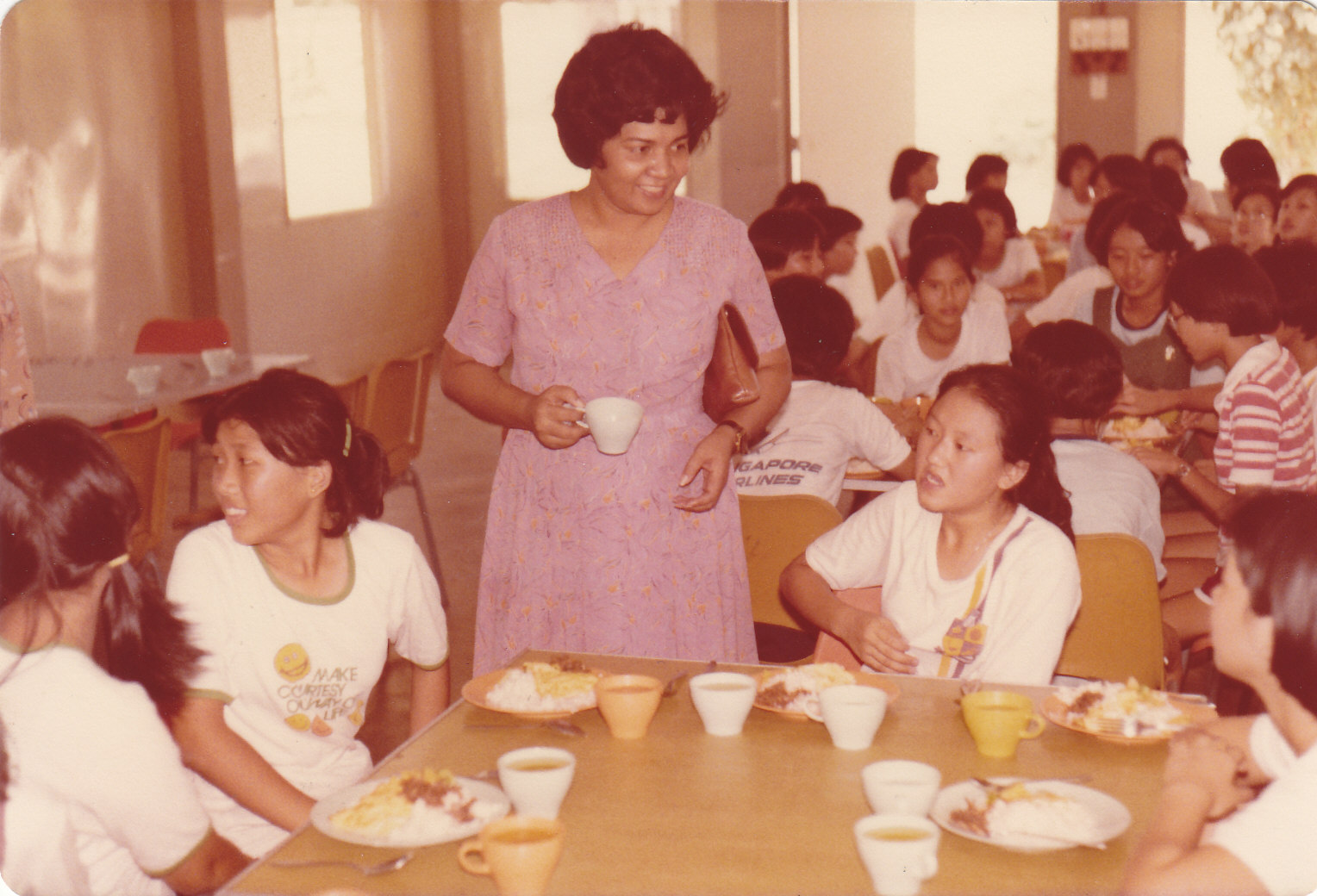 As Singapore entered the 1980s and headed inexorably towards developed nation status, TKGS, in tandem, kept improving its academic results and notched up more achievements. TKGS cemented its status as one of the best girls’ secondary schools in Singapore.
As Singapore entered the 1980s and headed inexorably towards developed nation status, TKGS, in tandem, kept improving its academic results and notched up more achievements. TKGS cemented its status as one of the best girls’ secondary schools in Singapore.
By the late 1970s, TKGS’ “old girls” – graduates from its earlier cohorts in the 1950s and 1960s – started to appear among the ranks of highly qualified successful professionals in diverse areas such as medicine, law, business, education and later in politics and entertainment. Such prominent old girls were invited as guests of honour to give keynote speeches on the annual Speech Days.
Successive cohorts of TKGS girls from the 1970s to the 1990s proved themselves more than capable of keeping pace with the rising academic standards and competition from other schools. The next goal was to promote another aspect of education – the students’ personal, social and moral development.
This was a task that the principal succeeding Mrs Tan Seng Hock, Miss Paramita Bandara, undertook with aplomb. During her 8-year stint (1977 - 1984), her visionary leadership led TKGS to achieve a harmonious balance between the cultivation of the students’ character and the development of their academic prowess. The school has always stressed these aspects and, under Miss Bandara, they were reinforced with more in-depth involvement in community and voluntary activities.
Two Food and Fun Fairs were held (the first one in 1978 and the second in 1981) to raise funds for charity and additional school facilities. Youth Day was a tradition and emphasis was placed on community service. “Care and Share” and “Service Before Self” were some of the themes TKGS used over the
 decades, especially from 1979 onwards, to undertake school-wide projects in aid of worthy causes and people in need. TKGS also sought more intensive engagement in the arts.
decades, especially from 1979 onwards, to undertake school-wide projects in aid of worthy causes and people in need. TKGS also sought more intensive engagement in the arts.
Miss Bandara encouraged the blossoming of the students’ artistic, creative, innovative and entrepreneurial skills. She made assembly performances by every class compulsory, the production of which the students were entirely responsible for. This proved to be a big hit and paved the way for TKGS’s emergence as an arts and drama powerhouse. It was also during Miss Bandara’s stint that the school motto “Moribus Modestus” received an English translation – “Demure & Resolute”.
In 1983, the school was also selected by MOE for the Music Elective Programme (MEP), as one of the only four schools to offer Music as an examinable ‘O’ level subject.
Miss Bandara also strove to make TKGS a second home for both staff and students, believing that a conducive physical environment would lead to a greater sense of belonging and productivity. Measures she took to foster such an atmosphere included providing landscaped gardens with benches for students as a gathering point. Likewise, centralising the library and reducing the number of staff rooms to two made the school a more cohesive and intimate one – an avenue for one and all to mix and interact more often.
In leading TKGS as principal, Miss Bandara believed in treating other people’s children as her own, the value of empathy and the importance of walking in the shoes of her students and teachers. Her emphasis extended beyond academic excellence – she focused on preparing her students for the larger world and life as well.
=================================================
That Special Spirit in the Air
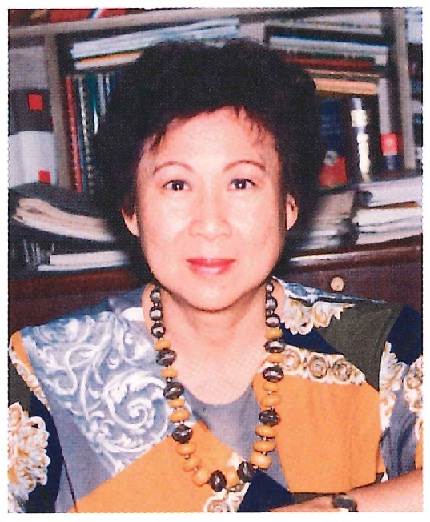
“One of the earliest impressions I had of TKGS was its mission school vibes, though it was a government school. I also discovered that many teachers had been there for more than ten years. What struck me most was the warmth among the staff – the teachers got on very well; the older staff were like mentors to the younger ones.”
Mrs Huang Chai Lean, Principal, 1985 - 1995
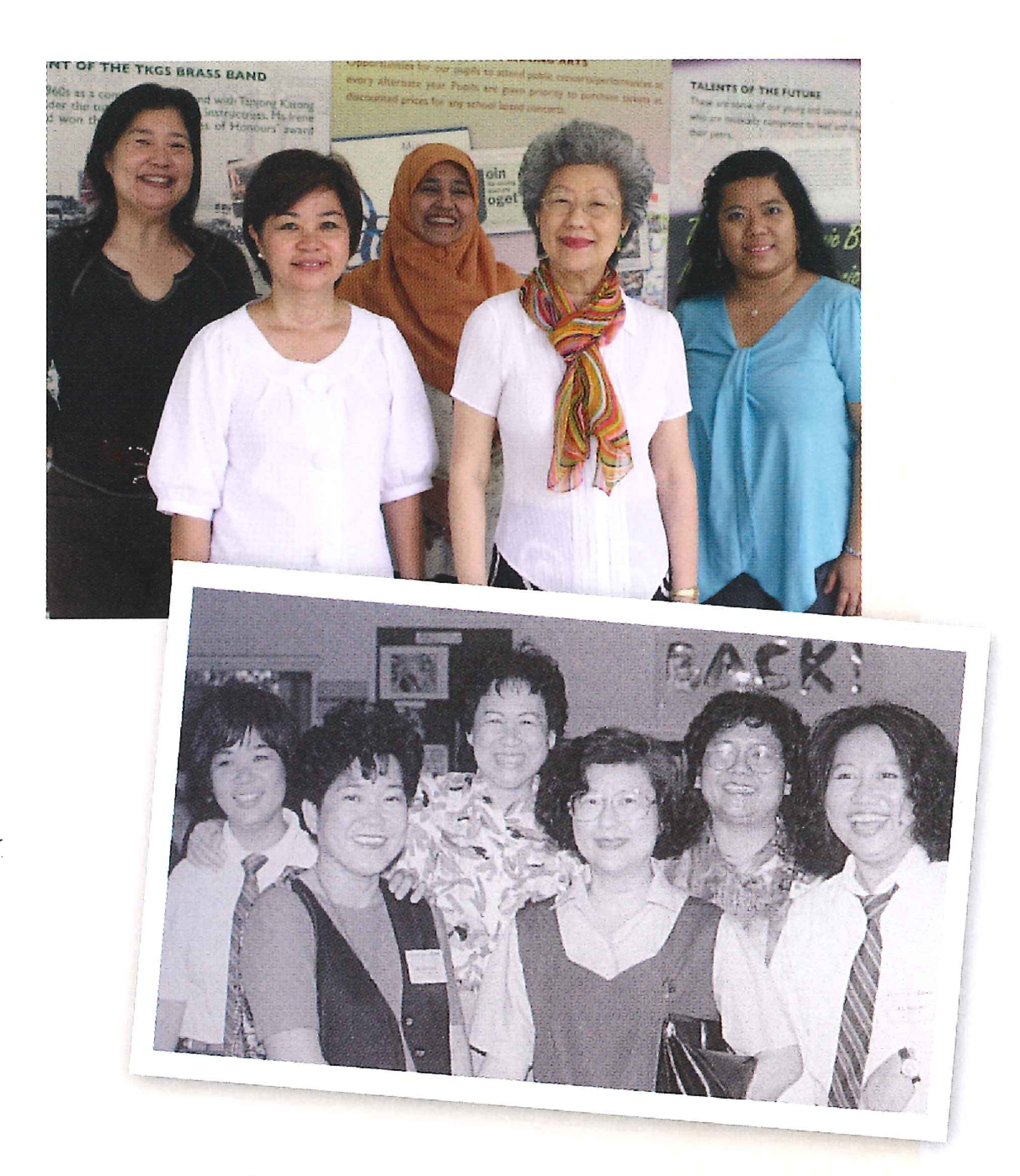 The establishment of TKGS’ own band and the making of the TKGS’ brand name as a “musical” school were the brainchild of Mrs Huang Chai Lean, who started her principalship in 1985 and built on the successes of Miss Bandara and the earlier Principals. Mrs Huang came up with the concept of the now-iconic TKGS musicals, the first of which was The Wizard of Oz, believing that TKGS students needed more challenges and exposure to the arts to develop their character and poise. Mrs Huang used these full-scale musicals as a platform to bring together student talents from the Band, Choir and Drama.
The establishment of TKGS’ own band and the making of the TKGS’ brand name as a “musical” school were the brainchild of Mrs Huang Chai Lean, who started her principalship in 1985 and built on the successes of Miss Bandara and the earlier Principals. Mrs Huang came up with the concept of the now-iconic TKGS musicals, the first of which was The Wizard of Oz, believing that TKGS students needed more challenges and exposure to the arts to develop their character and poise. Mrs Huang used these full-scale musicals as a platform to bring together student talents from the Band, Choir and Drama.
The success of the musicals and the showcasing of students’ artistic abilities, creativity and team spirit more than validated her then radical idea. They marked her legacy to TKGS.
Links with ex-students were established in a more formal manner with the setting up of the TKGS Alumni in 1988. International connections were forged with the admission of the first batch of Association of Southeast Asian Nations (ASEAN) student scholars in 1990. All these developments pointed to TKGS’ increasing engagement with the larger world outside its school walls.
=================================================
Riding the Waves of Change

“In the moral and social domain, our girls have embarked on a learning journey that has taken them into the realm of consciousness of our history and heritage, our political being and our awareness of our national vulnerabilities and possibilities.
Miss Leong Yop Pooi, Principal, 1995 - 1998
(Annual 1998)
The mid-1990s saw the emergence of globalisation, the rise of the internet and their paradigm-changing revolutionary impact on societies worldwide. Within Singapore, the Ministry of Education’s “Thinking Schools, Learning Nation” (TSLN) movement and key programmes such as the IT Masterplan and National Education led schools to launch new initiatives and review teaching methodologies to meet these challenges and prepare students for a fast changing world.
Internally, TKGS experienced tremendous changes as well. TKGS’ pre-university centre was phased out in 1993, in line with MOE policy. In 1995, the school moved - after a two-year delay – to its new premises at Dunman Lane, though the official opening only took place in 1997. With the appointment of Ms Leong Yop Pooi as the next principal, 1995 also marked the end of Mrs Huang’s 10-year stint, the second-longest of any TKGS principal. Miss Leong sought to develop and refresh a sense of identity for the school, which had been uprooted from its long-time ground and transplanted to a new site and building. The landmark sculpture “The Spirit of TKGS” was commissioned during her time and unveiled by Mr Teo Chee Hean, then Minister for Education, during the school’s official opening.
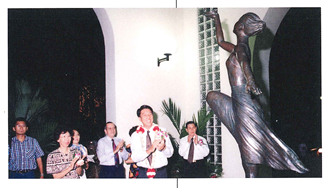 “Schools seeking to become Autonomous Schools must have in place a system that has demonstrated the ability to achieve sustained good academic results. Beyond academic results, the schools must also have a well-rounded education programme that provides opportunities for students to fully develop themselves. These schools must also have built up strong bonds with the school’s community – parents, alumni and the local community.”
“Schools seeking to become Autonomous Schools must have in place a system that has demonstrated the ability to achieve sustained good academic results. Beyond academic results, the schools must also have a well-rounded education programme that provides opportunities for students to fully develop themselves. These schools must also have built up strong bonds with the school’s community – parents, alumni and the local community.”
Mr Teo Chee Hean, then Minister for Education
Other significant historic developments include gaining autonomy and the conversion to a single-session school together with its relocation. Bearing in mind the stringent conditions required of autonomous status, it is a sterling testimony to TKGS’ brand of holistic education, standing and quality that MOE granted it autonomous status in 1995, and with the new status, the additional funds for enrichment programmes as well as greater freedom to try out innovative ideas in learning. It was also during Miss Leong’s tenure as principal that she introduced the String Ensemble – further strengthening TKGS’ niche in music and the aesthetics.
=================================================
Striding Confidently into the 21 st Century
“Our aim is to offer a variety of programmes to Singapore students so that we can all build up different
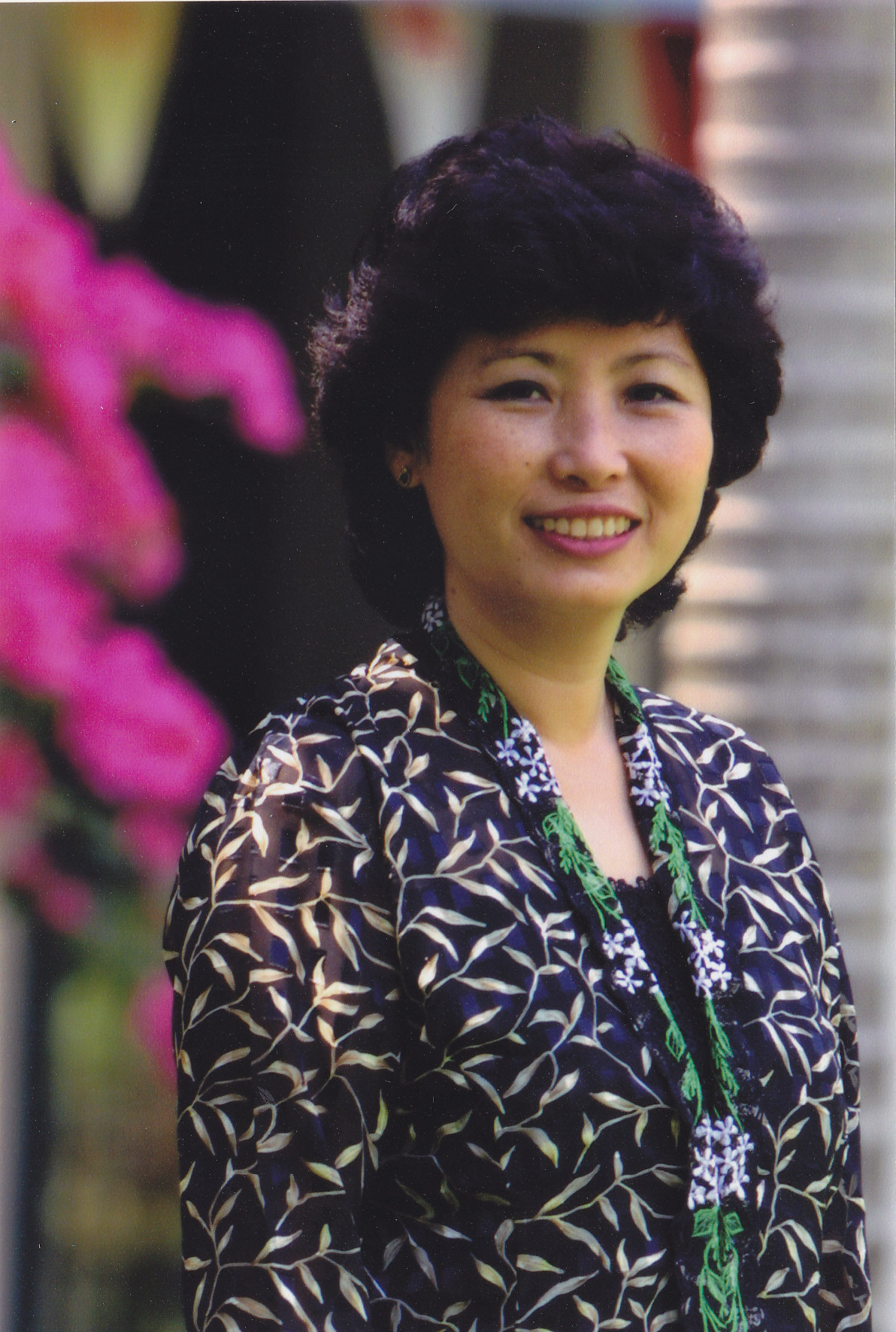 areas of excellence…if we are able to bring in girls who excel in various areas, they will in turn become role models and inspire others.”
areas of excellence…if we are able to bring in girls who excel in various areas, they will in turn become role models and inspire others.”
Mrs Kelvyna Chan, Principal, 1998 - 2003
In 1998, Mrs Kelvyna Chan took over the reins. Known as a relationship builder, she brought her immense experience and warm personality to TKGS. Even before she started her stint as principal, she would visit TKGS to touch base with the staff and get a feel of the school culture. Her warmest memories of her time in TKGS, not surprisingly, involved the relationships she had with staff and students.
An advocate of holistic education, Mrs Chan embarked on a successful mission to catapult TKGS to the elite level in the sports realm. TKGS gained prominence as a sporting power during her tenure, with two national athletes groomed from the Talent Identification Programme started during her stint. Her Talent Identification Programme helped TKSG carve out areas of excellence both in sports and music.
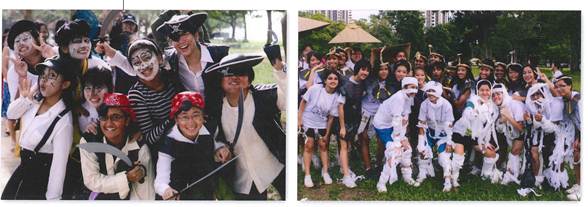 School cheers and interclass cheerleading competitions were emphasised to build team spirit and a sense of camaraderie among students. The “TK Philosophy” cheer became the students’ source of inspiration. Yet another innovation under Mrs Chan was mass participation activities such as class walk-a-jogs in costumes with a carnival-like atmosphere – fondly known as the “Zany Green Parade”. This fostered a bonding and community spirit among the students.
School cheers and interclass cheerleading competitions were emphasised to build team spirit and a sense of camaraderie among students. The “TK Philosophy” cheer became the students’ source of inspiration. Yet another innovation under Mrs Chan was mass participation activities such as class walk-a-jogs in costumes with a carnival-like atmosphere – fondly known as the “Zany Green Parade”. This fostered a bonding and community spirit among the students.
TKGS also leapt into the internet era in 1998, when it joined Phase 2 of the IT Masterplan, MOE’s plan for integrating information technology (IT) in Singapore’s education system. This included a school-wide network with high-speed delivery of multimedia services. Latter schemes included the Information Skills Programme in 2004 to equip all students with useful IT knowledge.
=================================================
A New Millennium, A New Dawn
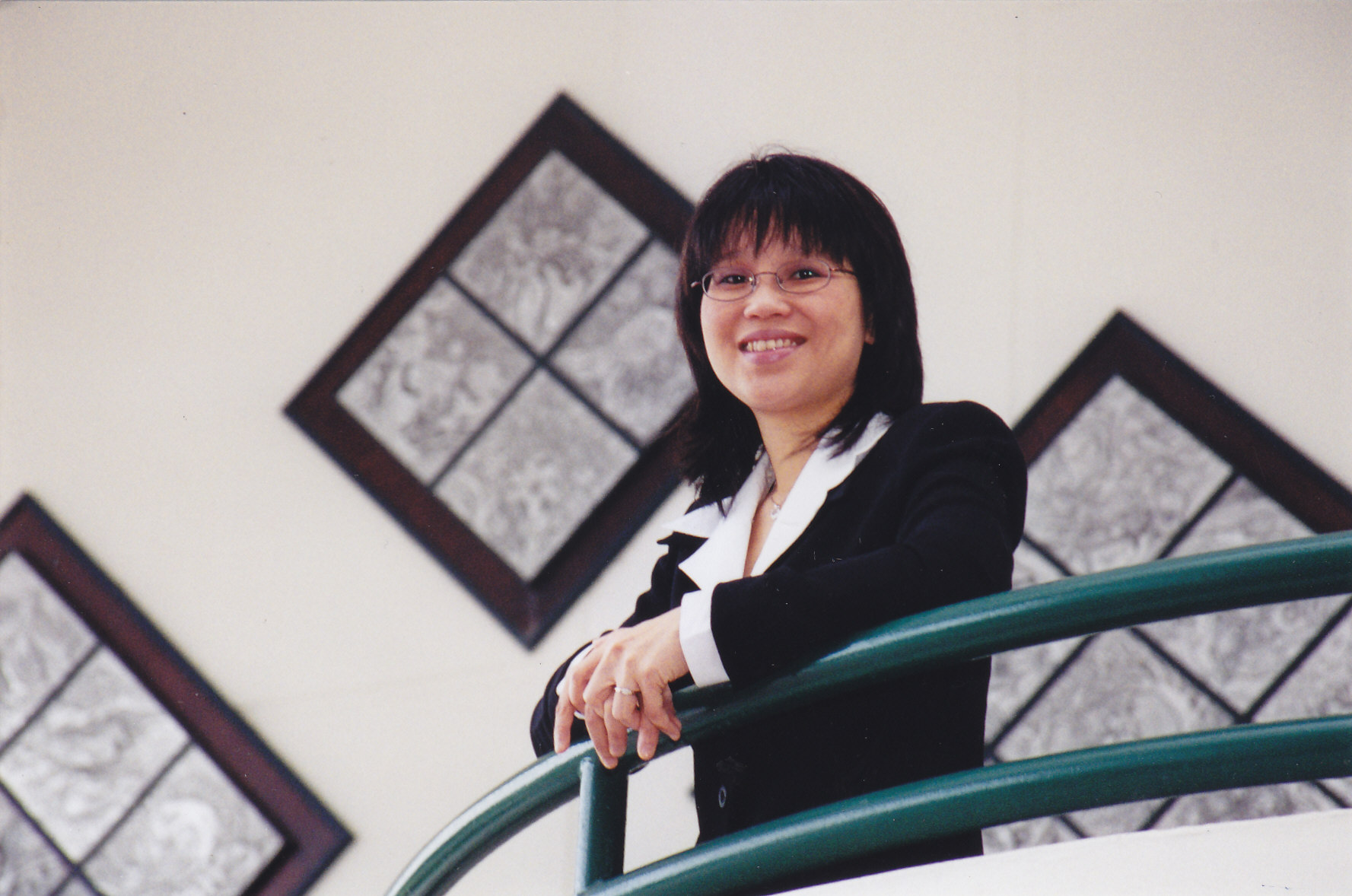 “I see education as crucial for a nation’s progress, and as social leveller and means of upward mobility. At TKGS, we wanted to nurture future generations to be leaders in their own right in whatever field they choose, whether in Singapore or globally.”
“I see education as crucial for a nation’s progress, and as social leveller and means of upward mobility. At TKGS, we wanted to nurture future generations to be leaders in their own right in whatever field they choose, whether in Singapore or globally.”
Mrs Loke-Yeo Teck Yong, Principal, 2003 - 2005
The next Principal, Mrs Loke-Yeo Teck Yong, had a relatively brief stint as Principal from 2003 to 2005, but she was Vice-Principal from 2000 to 2002 and benefited from knowing the staff and the school culture well. A dynamic leader who believed in collective leadership and teamwork, Mrs Loke-Yeo initiated innovative programmes to bring teaching and learning in TKGS to a higher level. A more flexible timetable was introduced, to enable the school to operate on a two-week cycle with each period lasting 50 minutes. The aim was to give teachers sufficient time to employ innovative teaching strategies, and engage students more deeply in the learning process. The mid-year examinations were abolished to allow for a smoother curriculum flow and create more time for enrichment activities. Students’ academic progress were tracked through continual assessments instead. Alternative modes of assessment, other than the traditional pen and paper mode, were encouraged.
In 2005, TKGS became one of the first schools in Singapore to offer both the Chinese and Malay Special Programmes for students not offering the Chinese
 and Malay mother-tongue languages respectively. In end 2005, TKGS announced that it would be among the first schools in Singapore to offer Economics and Drama as ‘O’ level subjects. The aim was to offer more subject choice to students and develop the niche talents of TK girls.
and Malay mother-tongue languages respectively. In end 2005, TKGS announced that it would be among the first schools in Singapore to offer Economics and Drama as ‘O’ level subjects. The aim was to offer more subject choice to students and develop the niche talents of TK girls.
In the area of character development, TKGS developed its Integrated Character Development Programme known as LEGACY (Leading, Empowering, Guiding, Affirming and Challenging Youth) comprising classroom and experiential learning of moral education during curriculum time. Believing in the importance of engaging parents, the “parents’ corner” in the school website was created to provide parents easy access to pertinent information from the school. In the area of national education, the TKGS Heritage Corner came into fruition.
Mrs Loke-Yeo also presided over the 50 th anniversary celebrations of TKGS’ founding in 2003, the highlight of which was a gala dinner at the Swissotel the Stamford. Hitting the half-century mark meant TKGS was now one of the schools in Singapore that could boast a substantial history, to go along within its catalogue of illustrious achievements.
=================================================
A New Principal, A Former TK-Girl
“Our aim in TKGS is to develop every TK girl to be a leader who is grounded in values; a leader who acts with determination, leads with integrity, serves with humility and grows in graciousness.”
Mrs Phyllis Lim, Principal, 2005 - 2011
When Mrs Phyllis Lim was posted to TKGS as the new Principal in 2005, it marked a certain coming of age for TKGS. For the first time ever, one of the
school’s old girls had returned to serve in its highest position. One of Mrs Lim’s first acts as Principal was to crystallise the four values of the school to serve as the students’ guiding compass and for better alignment of school programmes. A series of workshops and meetings were held in 2005 for students, teachers, parents and the Alumni to gather views and identify appropriate values which represented the ethos of the school over the years. The values: determination, humility, integrity and graciousness were unveiled to the school community in 2006.

In the same light, the school mission was reviewed to place more emphasis on developing every TK girl to be a “leader”. Correspondingly, the school’s student leadership development programme was improved to create more leadership opportunities for students and develop leadership training for different levels of student leaders. In the area of character development, the school introduced the “Habits of Mind” framework and develop habits of thinking such as “persistence and interdependent thinking in students.”
As part of the ongoing journey towards organisational excellence, the school adopted a more deliberate approach to engage in deeper partnerships with parents and in benchmarking with other schools and external organisations in the spirit of continuous improvement.
Mrs Lim led the school through the MOE Autonomous School revalidation exercise in 2007. TKGS’ autonomous school
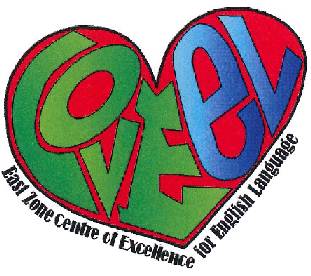 status was renewed for another five years with a much-improved score from the last external appraisal exercise in 2002. In 2007, TKGS was appointed as the East Zone Centre of Excellence (COE) for English language, in recognition of its innovative approach in the teaching and learning of English and the students’ consistently good performance for English at the ‘O’ level examination.
status was renewed for another five years with a much-improved score from the last external appraisal exercise in 2002. In 2007, TKGS was appointed as the East Zone Centre of Excellence (COE) for English language, in recognition of its innovative approach in the teaching and learning of English and the students’ consistently good performance for English at the ‘O’ level examination.
Under Mrs Phyllis Lim’s leadership, the school tightened its teaching and learning framework and reviewed tis academic programme. More support was given to students to better prepare them for the ‘O’ level examinations. TKGS’ ‘O’ level results continued to improve steadily, with the 2007 cohort of Secondary 4 girls achieving the best ‘O’ level results in ten years. A third of the cohort (119 students) had seven or more distinctions and 98% were eligible for admission into a junior college. The excellent results sealed TKGS’ position as one of the premier schools in Singapore.
=================================================
Accolades
“…[The] challenge…is to preserve at all costs the unique TKGian spirit of holistic education, of a learning environment rich in the aesthetics, the homely close knit school community we have here, the spontaneous creative, articulate nature of the girls and their spirit of determination and humility, of giving back to the community. All these intangible aspects of TKGS education must be preserved.”
Mrs Phyllis Lim, Principal, 2005 - 2011
TKGS swept various national awards in 2006, such as the MOE Academic Value-Added Award (Silver), National Arts Education Award (Silver) and MOE Development Award for Character Development, consolidating its reputation as a school with quality programmes and innovative initiatives. The introduction of Economics as an ‘O’ level subject at Secondary 3 level and Drama being offered as an elective in Secondary 2, initiatives by Mrs Loke, were realised in 2006.
In 2007, TKGS continued to sweep other awards. TKGS received its third Sustained Achievement Award (SAA) for Sports and its eighth Sustained Achievement Award (SAA) for Physical Fitness. Affirmation of the school’s strength went beyond academics and CCAs. In 2007, TKGS was also awarded the Schools Green Audit Award (Orchid). In 2008, TKGS received the Sustained Achievement Award (Academic Value-Added).
The quest for a better future goes on, new frontiers are charted, greater heights are planned to be scaled – these embody the TKGS spirit and culture of continuous improvement, by having firm anchors in its strong past, strengthening its resolve in the present and working towards an even brighter future with true grit, tenacity and graciousness.
=================================================
Building on the Past, Redefining Our Future

“My job is to take all that the Principals who have come before me have done and redefine it into something forward-looking, nationally-relevant and above all, what distinguishes itself as truly TKGian.”
Mrs Mary Seah, Principal, 2012 - current
As TKGS celebrates 60 years, the cornerstone of education giving hope, enabling social mobility remains unchanged. When asked to envision a Singapore in 2030, Singaporeans have indicated a desire to build a society where there is a more diverse definition of success, and a compassionate society where the disadvantaged are cared for and strong sense of volunteerism prevails.
Education must continue to instil confidence that the future generations will indeed take it upon themselves to care for, lead and serve others. As TKGS celebrates its 60 th anniversary, the school redefines its brand of leadership and focuses on helping students be good stewards of their talents, in line with the ethos of student-centric, values-driven education.
Nurturing Creative Stewardship
TKGS+ is P rogramme to develop deep U nderstanding in subject disciplines and encourages L eadership and S tewardship of students’ talents. TKGS focusses on the learner in an enhanced baseline curriculum that emphasizes disciplinary understanding. Students then apply their understanding in authentic experiences within and beyond the classroom (including local and international science research attachments, global perspective programmes, enhanced music mentorship programmes etc.) This programme emphasizes the need for students to be good stewards of their talents and to lead in efforts to serve in the community. Students learn values and attitudes associated with the disciplines and apply these to benefit communities and the environment. In summary, TKGS+ marries academic excellence with service, and in the process develop TKGians to be ‘Accomplished young women of character and grace’.
”Helping others should never be a thought that comes at our convenience”
Alumnus Sally Lee, graduated 1971, Humanitarian Relief helper, Red Cross
Values-in-Action@TKGS is inspired by “noble service for noble souls to do”. ViA@TKGS is a 4-year programme that starts at the lower secondary with the Community Problem Solving project that all students undertake as part of the core curriculum. At the upper secondary levels, TKGS hopes to enable TKGians to go beyond the school, to connect with and leverage governmental and civic groups, within and beyond Singapore in championing and serving various causes. A culminating feature of this programme is the mentorship model where graduating students and youth alumni mentor younger TKGians in causes close to their hearts.
| Vaishnavi would rather give back to her school rather than build her portfolio. Vaishnavi is all of 19 years of age, fresh from A Levels, and waiting to enrol in university. She is relief teacher, ViA mentor, the project manager of an ethnography project involving her juniors, Drama CCA ‘Senior’, and now, Chair of newly set- up TKGS Alumni Youth Chapter. Vaishnavi, who was Head Prefect (Class of 2010), would rather return to her alma mater to serve in myriad ways rather than build her portfolio by doing an internship or paid work in a law firm. She has since mentored students in a ViA project in Batam, coached others in ViA projects in school and, gathered many other youth alumni to be reconnected with the school in a Makan @ TKGS session and sign up as mentors. |
Building TKGS ethos in Truly TKGian ways
Social cohesion starts with strong school spirit. Some of the best ways of strengthening national identity and “kampong spirit” lie in leveraging the schooling experience, where pupils from different backgrounds and cultures are assimilated into a microcosm of society. This portal, together with the setting up of the TKGS Youth Chapter is an integral part of the Truly TKGS heritage curriculum. This will help strengthen the TKGS ethos in future generations of TKGians and also connect the growing network of TKGians, past and present.
As it is written in Leading Women: Women of Character and Grace (Devi, 2008), ‘the quest for a better future goes on, new frontiers are charted, greater heights are planned to be scaled – these embody the TKGS spirit and culture of continuous improvement, by having firm anchors in its strong past, strengthening its resolve in the present and working towards an even brighter future with true grit, tenacity and graciousness.’
Moribus modestus!
Source: Devi, G. U. (2008). Leading Women: Women of Character and Grace: The Story of Tanjong Katong Girls' School (1953-2008). Straits Times Press.)
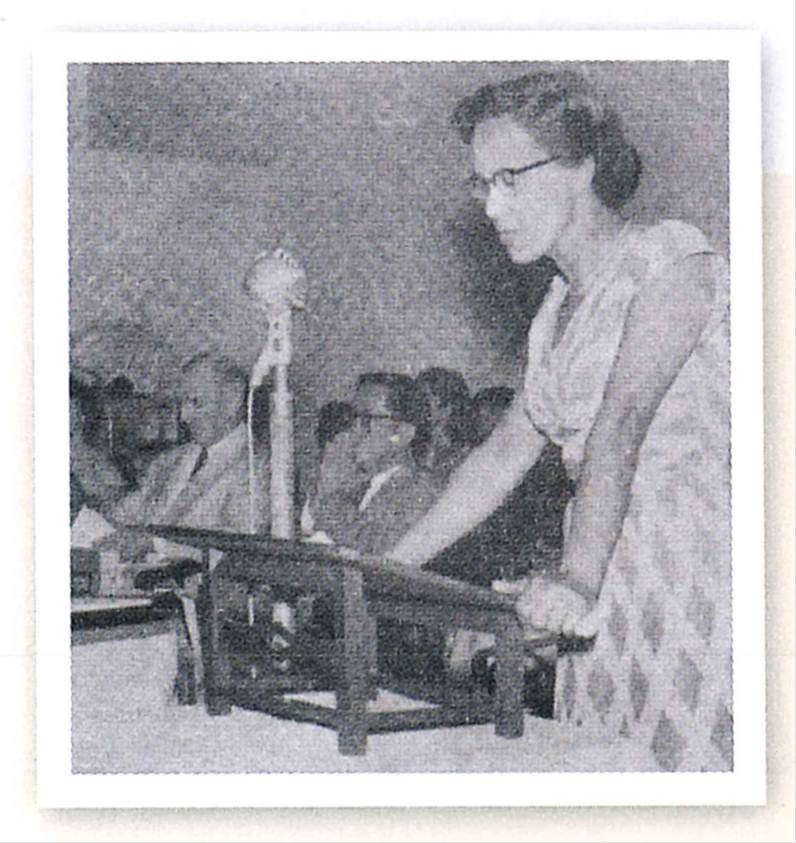 “…three years ago, at the official opening, I gave parents the assurance that they could expect solid work from the Staff of the school and a genuine concern for the welfare of every pupil that passed through our hands. I am satisfied today that we have honoured that promise and have laid sound foundations, on which much more has yet to be built…For every girl to look upon the school as her community for four years – to practice to live alongside her fellows in a spirit of cooperation, tolerance and unselfishness, remembering that no man can live unto himself when he lives with others – this, above all, is what we have striven over the past four years to inculcate into our pupils. I say, with all sincerity, that it is our genuine desire that our pupils go out into the world better citizens for having passed through the training ground of Tanjong Katong Girls’ School.”
“…three years ago, at the official opening, I gave parents the assurance that they could expect solid work from the Staff of the school and a genuine concern for the welfare of every pupil that passed through our hands. I am satisfied today that we have honoured that promise and have laid sound foundations, on which much more has yet to be built…For every girl to look upon the school as her community for four years – to practice to live alongside her fellows in a spirit of cooperation, tolerance and unselfishness, remembering that no man can live unto himself when he lives with others – this, above all, is what we have striven over the past four years to inculcate into our pupils. I say, with all sincerity, that it is our genuine desire that our pupils go out into the world better citizens for having passed through the training ground of Tanjong Katong Girls’ School.”
 impatience to blacken your horizon. Be consistent in your work, modest, tolerant and sympathetic in your dealings with people and your life will be rich.”
impatience to blacken your horizon. Be consistent in your work, modest, tolerant and sympathetic in your dealings with people and your life will be rich.”
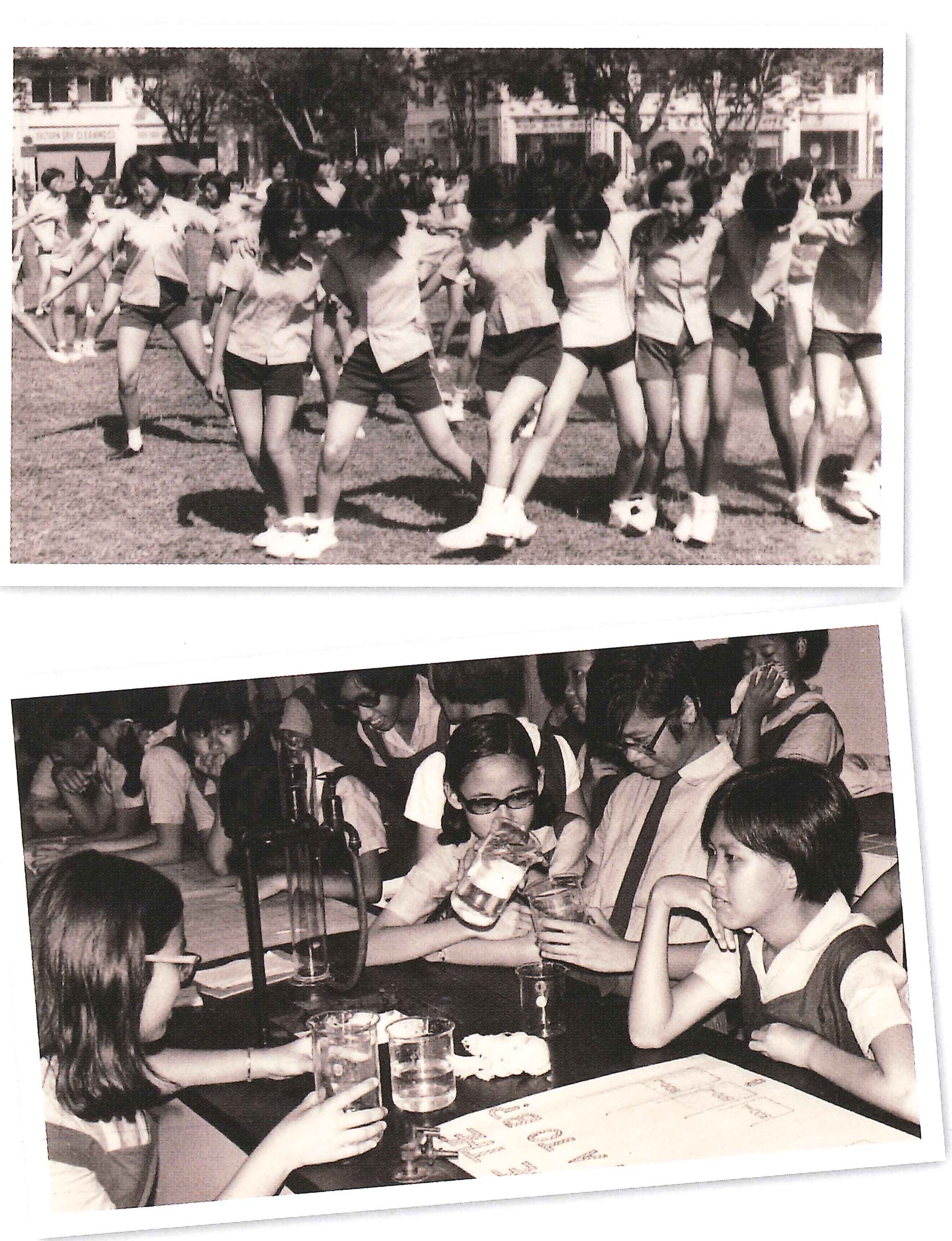 1960 marked the beginning of TKGS as a double session school to cater to the increased enrolment. It also sign-posted the end of Mrs Scott’s 7-year stint, with the succession of Miss See Tin See as Principal.
1960 marked the beginning of TKGS as a double session school to cater to the increased enrolment. It also sign-posted the end of Mrs Scott’s 7-year stint, with the succession of Miss See Tin See as Principal.
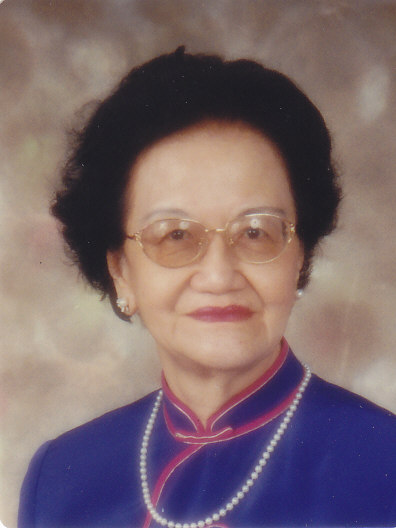 “TKGS will go on to play a distinguished part in the education and discipline of the future woman citizens of Singapore. What we do now will become history and tradition for those who come after us. ”
“TKGS will go on to play a distinguished part in the education and discipline of the future woman citizens of Singapore. What we do now will become history and tradition for those who come after us. ”
